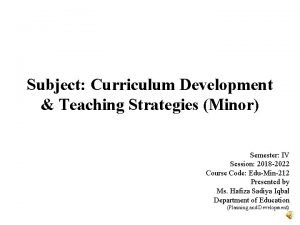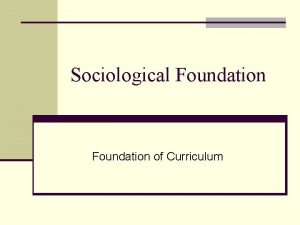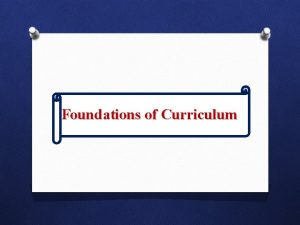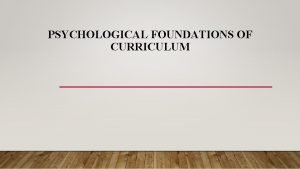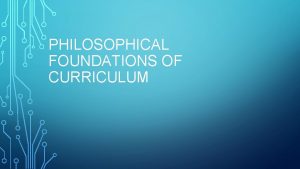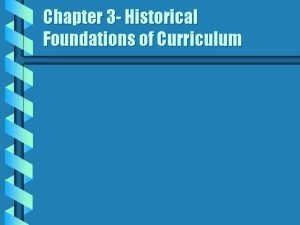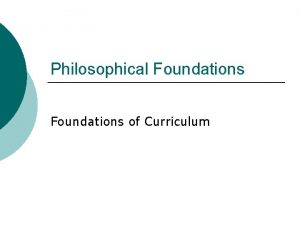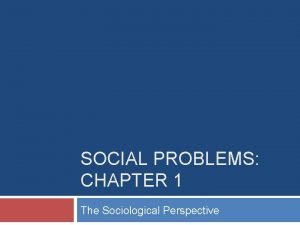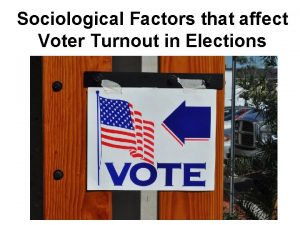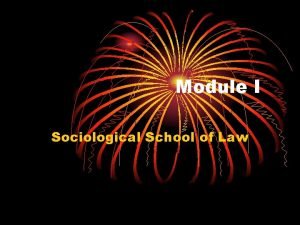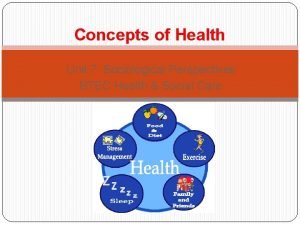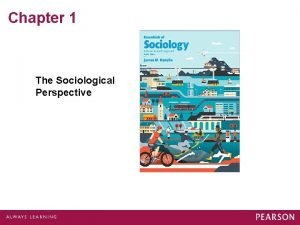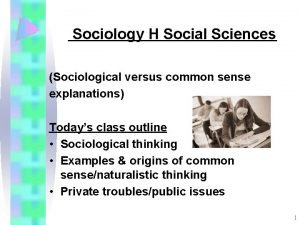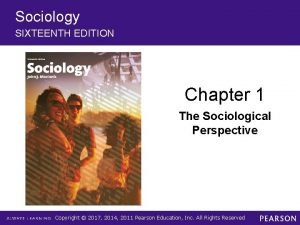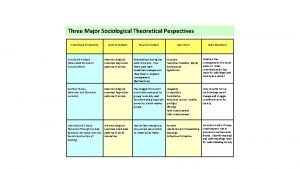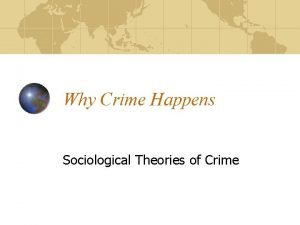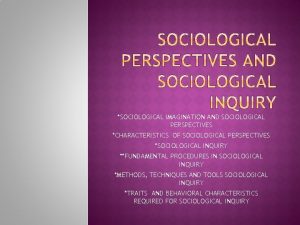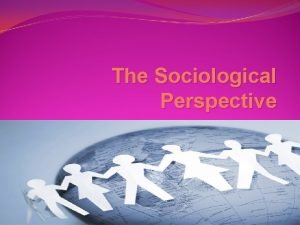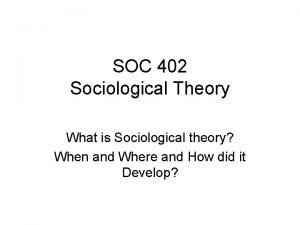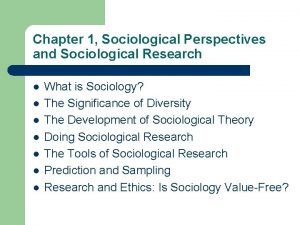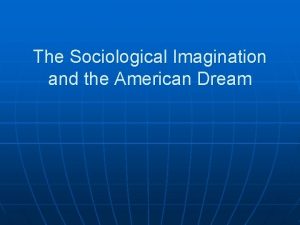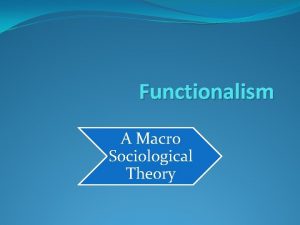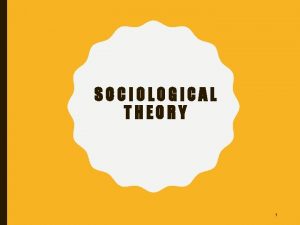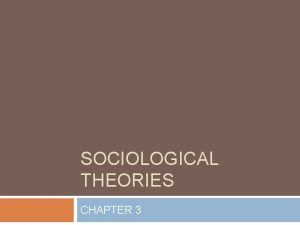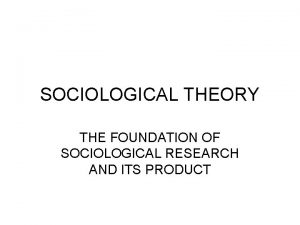Sociological Foundations of curriculum Sociological Foundations of curriculum



















- Slides: 19

Sociological Foundations of curriculum

Sociological Foundations of curriculum • Society influences the school curriculum. • Every society, community or nation has an essential social obligation to arrange the education of children. • Sociological considerations influence curriculum development in following distinct ways: - – It provides a way of carrying out changes in the behavior of the students as per the needs and demands of the society or nation. – To make education as an instrument of social changes and progress. – To preserve the culture and transmit it to young children. – To prepare the learners for the future society. • Thus sociological considerations provide necessary guidelines for developing a useful curriculum for the betterment and the progress of society.

Education and Society Schools exist within, not apart from, social context Schools emerges within society

Education and Society Why school exist in Society? Is education “Neutral”? Why do we have Adventist Schools? Is bias in education okay?

ltu re Economic Cu y log o chn Te Education Home Schools Ot he Ch ur ch Politics Society rs

Education and Society Educators cannot meaningfully consider the development or delivery of curriculum without reflecting on the relationship between schools and society.

A Dynamic, Changing Society • Society as a Source of Change • Schools as Agents of Change • Knowledge as an Agent of Change

Society as a Source of Change • Society changes rapidly • Sometimes education can not cope up with the fast changing society • Making the “Preparing for students for the world of Tomorrow” is difficult – Think about what we (society) have today that we don’t have last year, or five years ago, or even ten years ago.

Schools as Agents of Change Changing the literacy. From 3 Rs to cultural literacy, scientific literacy, computer literacy, technological literacy, television(or electronic) literacy, and information literacy • Dealing with Diversity – Diversity of culture. Impact of globalization • Race, Class, Gender, and Sexual Orientation – How do Adventist schools deal with this?

Knowledge as Agent of Change Has knowledge grown? • Explosion of Knowledge • What Knowledge Is of Most Worth? • Organizing Knowledge – Subject-centered • Areas of Knowledge

Processing Social-Educational Priorities What is your schools priority? • Education for All Students – Child-centered, Activity-centered, Experiencecentered • Focus on Academically Talented Students – Curriculum to challenge the “smart” students • Focus on Disadvantaged Students – How to help the disadvantage students gain same access to education?

Planning for Educational Change • What is the aim of education? Should aim of education changeable? • Schools should prepare education that is not separate from the world. The world is not static. • Creating relevant curriculum for the changing world. • Adventist education – Preparing the students for the world today and the world to come. (White)

Christian Curriculum and Society • The curriculum must prepare each student “for the joy of service in this world and for the higher joy of wider service in the world to come” (White, Education, p. 13) • Christian curriculum should Consider the world today. But Christian curriculum should not forget the curriculum for preparing student for kingdom.

Historical Foundations of Curriculum

Historical Foundations of Curriculum The following curriculum theories laid down their views on what curriculum is. • Franklin Bobbit (1876 -1956_ presented curriculum as a science that emphasizes the student’s needs. Curriculum prepares students for adult life. To Bobbit, objectives with corresponding activities should be grouped and sequenced. This can only be done of instructional activities and tasks are clarified. • Werett Characters (1875 -1952)- Like Bobbit, to Charters, curriculum is a science, it gives emphasis on students’ needs. The listing objectives and matching of these with corresponding activities ensure that the content or subject matter is related to the objective. The subject matter and the objectives are planned by the teacher.

• William Kilpatrict (1871 -1965)- Curricula are purposeful activities which are child-centered. The purpose of the curriculum is child development. The project method was introduced by Kilpatrick, whose model allowed the teacher and student to plan the activities. The curriculum develops social relationships and small group instruction.

• Harold Rugg (1886 -1960)- Rugg, the curriculum should develop the whole child. It is child-centered. With the statement of objectives and related learning activities, curriculum should produce outcomes. Rugg emphasized social studies, and that teachers plan the curriculum in advance

• Hollis Caswell (1901 -1989)- He saw curriculum as organized around social functions or themes, organized knowledge and learner’s interest. Caswell believes that curriculum is a set of experiences • Ralph Tyler (1902 -1994)- as one of the authorities on curriculum, Tyler believes that curriculum is a science and an extension of the school’s philosophy. It is based on student’s needs and interest. To Tyler , curriculum is always related to instruction. Subject matter is organized in terms of knowledge, skills and values. The Process emphasizes problem-solving. The curriculum aims to educate generalists and not specialists

• Historical development shows different changes in the purposes, principles and content of the curriculum. The different changes are influenced by educational philosophy, psychology and pedagogical theories. This implies that curriculum is everchanging, putting in knowledge and content from many disciplines
 Sociological imagination vs sociological perspective
Sociological imagination vs sociological perspective Sociological foundation of curriculum
Sociological foundation of curriculum Sociological bases of curriculum
Sociological bases of curriculum Philosophical foundations of curriculum development
Philosophical foundations of curriculum development Learning is explained in terms of wholeness of the problem
Learning is explained in terms of wholeness of the problem Philosophical foundations of curriculum
Philosophical foundations of curriculum Historical foundations of curriculum
Historical foundations of curriculum Curriculum trends in perennialism
Curriculum trends in perennialism Teori roscoe pound
Teori roscoe pound Social issue examples
Social issue examples Sociological factors that affect voting behavior
Sociological factors that affect voting behavior Leon duguit sociological school
Leon duguit sociological school Unit 7 health and social care
Unit 7 health and social care Chapter 1 the sociological perspective
Chapter 1 the sociological perspective Common sense and sociological explanations
Common sense and sociological explanations Sociology, 16th edition
Sociology, 16th edition Sociological imagination examples race
Sociological imagination examples race Three major theoretical perspectives in sociology
Three major theoretical perspectives in sociology Sociological theories of crime
Sociological theories of crime Definition of sociological criticism
Definition of sociological criticism

